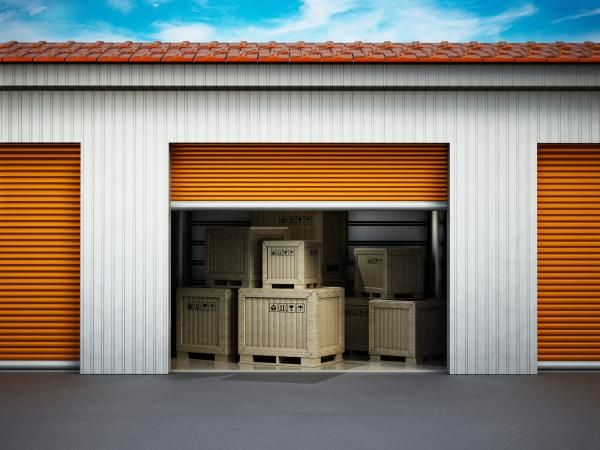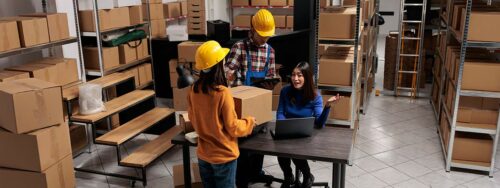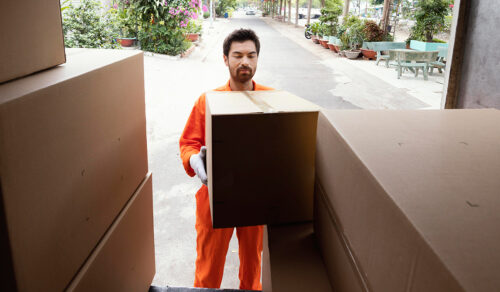Introduction
Storage units offer an affordable and convenient solution for storing belongings, whether you’re moving or decluttering. Finding the right storage unit and determining the cost of the storage unit can be tricky due to the many options available. You could be moving and need to store your belongings in the meantime. Or you may simply want a clutter-free home without getting rid of your belongings. Whatever the reason, it’s important to find the right storage unit price for your needs.
Storage Unit Cost Breakdown
When it comes to storage facilities rates, they can vary depending on the size and type of the facility you choose. In this post, we’ll look at different types of storage units and the costs of each storage unit type. You may be surprised at some of the more innovative, convenient options available!.
What Is a Storage Unit and How Do They Work?
Storage units are secure spaces rented out to individuals or businesses for storing items. They come in various sizes and types, such as self-storage, portable storage, and on-demand storage. Self-storage units require you to transport your belongings to the unit, while portable storage units are delivered to your location. On-demand storage services pick up your items and store them in a warehouse, delivering them back when needed.
Learn more: Renting a Storage Container: 15 Things You Need to Know
5 Pros of Storage Units
- Flexibility: Various sizes and types available to suit different needs.
- Security: Most storage units offer robust security features.
- Convenience: Ideal for temporary or long-term storage during moves or decluttering.
- Accessibility: Many facilities offer 24/7 access.
- Protection: Climate-controlled units protect sensitive items.
8 Factors and Tips for Finding the Best Value on Cost of Storage Units
1. Storage Unit Cost by Size
The size of your storage unit is going to have a big impact on the price. The larger the storage unit, the more it will cost. However, when looking at pricing, make sure you look at price per square foot. You may find that a 5×5 isn’t that much cheaper than a 5×10, but you will get double the space. So if you’re looking for a cheap storage unit, go with a smaller size. However, if you’re looking for the best value, make sure to compare price per square foot. The average storage unit in the United States costs between $60-$430 per month.
The table below shows the typical range of monthly prices for storage units by size:
| Size | Price Range per Month |
|---|---|
| Small (5×5 or 5×10) | $60-110 |
| Medium (5×15, 10×10, or 10×15) | $130-250 |
| Large (10×20, 10×25, or 10×30) | $210-$430 |
Learn more: Storage Unit Sizes: What Size Storage Unit Do I Need?
2. Storage Unit Cost by Type
When it comes to storage units, there are a few different types to choose from. Self-storage units and portable container storage are some of the most common options. However, a newer option called on-demand storage (from companies like Clutter) is becoming increasingly popular.
- Self Storage Units: Self-storage units are the most popular type of storage unit. They are typically located near residential areas and come in a variety of sizes. Self storage costs can vary depending on the size, location, and amenities of the unit and can be very affordable especially if you have a lot of items to store. However, this option requires you to handle all of the work like dropping off and picking up items on your own.
- Portable Container Storage: Portable container storage units are also popular. They offer a convenient way to store your belongings as you can have them delivered right to your door. Portable storage cost can vary depending on the size of the unit as well as where it needs to be transported to (which can increase the fee by thousands). One of the downsides to these is that if you need something from your storage unit, you have to pay to have the entire unit delivered which can be costly and inconvenient. Alternatively, you can store it on your own property, but it may take up a lot of space in your yard or driveway.
- On-Demand Storage: On-demand storage (like Clutter’s “Smart Storage”) is a newer type of storage becoming increasingly popular. With on-demand storage, rather than having access to a full unit, you can have your belongings stored in a secure facility and then delivered when you need them. With on-demand storage, you pay a monthly fee calculated by the number of items you have and their size, rather than for an entire unit. This can save money vs. renting a storage unit that you have or may not fill. In addition, you’ll usually pay for pick up and delivery of your items. This type of storage is affordable and flexible for those who want to request certain items to be delivered when needed and avoid the hassle of transporting items back and forth.
Learn more: How to Choose the Best Storage Unit: 6 Expert Tips
3. Storage Unit Cost by Location
The location of your storage unit will also play a role in pricing. Storage units in metropolitan areas will generally be more expensive than storage units located in rural areas. This is because real estate is generally more expensive in these areas and demand is higher in big cities where there’s simply less space for people to store excess items.
4. Storage Unit Cost for Climate Control
If you’re storing anything sensitive to temperature or humidity, you’ll want to get a climate-controlled storage unit. These units maintain a consistent temperature and humidity level, which protects your belongings from damage. While it seems like these types of storage units would cost a lot more, they do try to stay competitive so you may be able to find a climate-controlled unit for around the same price as one without climate control.
5. Storage Unit Cost for Convenience
Different types of storage units offer different types of convenience. For example, a self-storage drive-up unit is more convenient than a fourth floor unit far away from the elevator. As another example, on-demand and portable storage often have similar monthly rates to self-storage, but may charge an additional fee for pick up and delivery, especially for short-term rentals. These convenience factors and many more can play a role in how much you’ll pay for storage.
6. Storage Unit Cost by Time of Year or Month
The time of year can also impact storage unit pricing. Summer is the busiest season for storage units since people are moving and need somewhere to store their belongings. As a result, storage units tend to be more expensive during this time. If you’re flexible, you can save quite a bit by moving into a storage unit before or after summer.
Another thing to consider is that storage unit pricing can vary by time of the month. The first and last week of the month (especially weekends) are more expensive due to higher demand. By avoiding these busier times, you might be able to get a cheaper storage unit and/or cheaper pickup/delivery fees (for portable and on-demand storage) before the price goes up again.
7. Insurance for Storage Unit
Most storage units require you to have insurance for your belongings, and this cost isn’t usually built into your storage fees. This is to protect the storage facility in case of any damage to your belongings. You can typically get storage insurance through your homeowners or renters insurance policy. If you don’t have either of these, you may be able to purchase a storage insurance policy from the storage facility itself. Some storage options, such as on-demand storage, provide the option to opt in or out of insurance, providing maximum flexibility to their customers.
8. Lease or Contract for Storage Unit
The length of your storage unit lease or contract can also impact the price. You may get better monthly storage rates if you sign a contract for 6 months or a year, rather than paying month-to-month for the same amount of time.
Which Type of Storage Unit is Best?
There is no right answer regarding which type of storage unit is better than the others. It all depends on your individual needs and preferences. If your number one concern is the freedom to go visit your storage unit yourself at a moment’s notice, then your best bet is probably a traditional self-storage unit. With a self-storage unit, you can access your items at any time within the facility operating hours.
Convenient + Affordable Storage
However, if you’re looking for convenience, then portable storage or on-demand storage may be a better option for you. Portable storage is good if you want to access all of your items at once. However, you need somewhere for the storage container to be delivered which can be tough in a city. The problem with a portable storage unit is that if you need to grab something from storage, you have to pay to have the whole unit delivered which can be expensive and a bit of a hassle if you just need to grab a few things.
If you want an affordable and convenient solution, you might consider on-demand storage. With on-demand storage, your belongings will be stored in a secure facility and then delivered to you when you need them. Some on-demand storage companies (like Clutter) will even provide you with an online photo catalog of your belongings so you can easily pick out exactly what you want to get delivered. This is a great option if you don’t want to deal with running to storage and digging through a unit. It’s a full-service option that will save time and hassle.
What Factors Affect the Cost of a Storage Unit?
Several factors influence the cost of storage units:
- Location and Convenience: Storage units in metropolitan areas tend to be more expensive than those in rural areas due to higher demand and real estate costs.
- Time: Rental costs can vary depending on the time of year and month. Summer and month-end periods typically see higher prices due to increased demand.
- Service: The type of service (self-storage, portable storage, or on-demand storage) affects the cost. On-demand services may charge for pickups and deliveries.
- Size: Larger units cost more, but considering the price per square foot can help determine the best value for your needs.
- Season: Demand for storage units peaks in the summer, leading to higher prices. Renting during off-peak times can save money.
- Insurance: Most storage units require insurance for your belongings, which is an additional cost. Some facilities offer insurance policies, or you can use your homeowners or renters insurance.
Learn more: Everything To Know About Storage Auctions
6 Tips for Reducing the Rental Cost of Self-Storage
1. Choose the Right Size: Select a storage unit that fits your needs without paying for unused space. A smaller unit may suffice if you organize your belongings efficiently.
2. Compare Prices: Research multiple storage facilities in your area to find the best rates. Consider factors like location, accessibility, and security features.
3. Opt for Long-Term Contracts: Some facilities offer discounts for committing to longer rental periods. Signing a 6-month or annual contract can reduce your monthly rate.
4. Use Non-Climate-Controlled Units: If your items are not sensitive to temperature or humidity, opting for a non-climate-controlled unit can save money.
5. Avoid Peak Rental Times: Renting a storage unit during off-peak times, such as the winter months or mid-month, can help you secure lower rates.
6. Utilize Promotions and Discounts: Look for facilities offering promotions, discounts for new customers, or referral bonuses to lower your rental costs.
By considering these factors and tips, you can find a storage unit that meets your needs without breaking the bank.
Conclusions about Storage Unit Pricing
When determining storage unit pricing, your best bet will always be to first determine what type of storage you need and then get quotes from a few services near you. However, we hope that this article helped answer the question of how much storage units cost, as well as the different types of storage units: self-storage units, portable container storage, and on-demand storage. They each have their benefits and drawbacks, so it’s important to consider what is important to you.
Storage Unit Costs – FAQs
How much do storage units cost per month?
The monthly cost of a storage unit varies based on factors like size, location, and additional features. On average, prices range from $60 to $430 per month.
Is a 10×10 storage unit sufficient for my needs?
A 10×10 storage unit is typically adequate for storing the contents of a one-bedroom apartment, including furniture, appliances, and boxes.
Can a 10×10 storage unit accommodate a couch?
Yes, a 10×10 storage unit can fit a standard couch, along with other furniture and boxes.
What items can you store in a 5×5 storage unit?
A 5×5 storage unit is suitable for storing small furniture, seasonal items, boxes, and personal belongings, roughly equivalent to the contents of a walk-in closet.
How much can you fit in a 10×20 storage unit?
A 10×20 storage unit can hold the contents of a multi-room house, including large furniture, appliances, and several boxes, making it ideal for moving or extensive storage needs.
What is the payment process for storage units?
Storage units are typically rented on a month-to-month basis. Payments are due at the beginning of each rental period, and many facilities offer online payment options for convenience.
How much does a storage container cost?
The cost of a storage container varies based on size and rental duration. Portable storage containers can range from $150 to $500 per month, with additional delivery and pickup fees.
What is the price of a storage unit?
Storage unit prices vary depending on factors like size, location, and features. Monthly costs generally range from $60 to $430.
Why have storage container prices increased?
Storage container prices have risen due to factors such as increased demand, higher manufacturing costs, and logistical challenges impacting supply chains.
What is the cost of storage insurance?
Storage insurance typically costs between $10 and $30 per month, depending on the value of the items being stored and the level of coverage required.
How do you determine storage costs?
Storage costs are calculated based on unit size, location, rental duration, and additional features like climate control. Comparing multiple facilities can help find the best rate.
How much does a portable storage container cost?
The cost of a portable storage container varies by size and rental duration, typically ranging from $150 to $500 per month, with additional fees for delivery and pickup.








